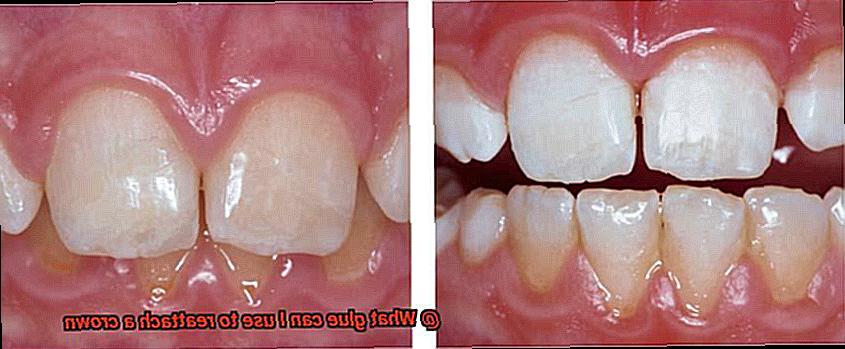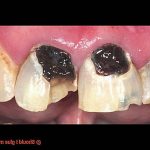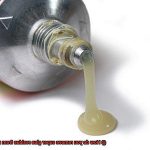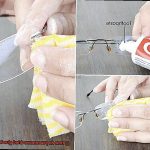Have you ever felt the sinking feeling of a loose or missing crown? It’s a frustrating and all-too-common dental issue that can make you feel uncomfortable, self-conscious, and even in pain. But don’t worry – there’s a solution.
With the right glue, you can reattach your crown on your own without having to spend a fortune at the dentist’s office. But with so many adhesives out there, how do you know which one is right for you?
Before we dive into the different types of adhesives that work best for crown reattachment, it’s important to remember that this is only a temporary fix. You should always visit your dentist as soon as possible to avoid further damage or infection.
In this blog post, we’ll explore the fascinating world of dental adhesives and help you find the perfect glue for reattaching your crown safely and effectively. From dental cements to temporary bonding agents, we’ll break down each type and its specific characteristics so that you can make an informed decision.
So sit back, grab a cup of coffee (or tea), and let’s discover the secrets of crown reattachment together.
What is a Crown and Why is it Important?
Contents
Dental crowns are like superheroes of the dental world, saving the day by restoring damaged or weakened teeth. These tooth-shaped caps can be made from various materials, including porcelain and metal, and are placed over a damaged tooth to improve its appearance, shape, strength, and alignment. But why are dental crowns so important?
For starters, they’re like a fortress, protecting weak teeth from further damage by holding them together and preventing them from breaking apart. This means that patients with weakened or damaged teeth can avoid more severe dental problems down the line. Crowns also restore the function of damaged teeth by allowing patients to chew and speak properly. This is particularly important for patients with missing or damaged teeth who may have difficulty eating or speaking without discomfort.
But wait, there’s more. Dental crowns also have a cosmetic benefit by covering up unsightly cracks, stains, or gaps. They can even be used in conjunction with dental implants or bridges to replace missing teeth, restoring the natural look and feel of a patient’s smile.
However, just like any superhero, dental crowns can experience setbacks. They may become dislodged or fall off due to factors such as decay, trauma, or improper fit. If this happens, it’s crucial to use the right type of glue or adhesive to reattach the crown in order to avoid further damage or discomfort.
While some may be tempted to use over-the-counter glues or adhesives like superglue or household adhesives, these can actually be harmful to your teeth and gums and may even cause further damage to the crown. Instead, dentists recommend using resin cements or glass ionomer cements for reattaching crowns. Light-curing cement is preferred by many dentists because it allows for greater control and precision, while glass ionomer cement is known for its ability to release fluoride and protect against decay.
Types of Dental Adhesives for Crowns
If you’ve ever had a dental crown fall off, you know how important it is to choose the right adhesive for reattachment. With so many options available, it can be hard to know where to start. Fortunately, we’ve got you covered with this guide to the three main types of dental adhesives for crowns.
First up is Zinc Oxide Eugenol (ZOE) Cement. This temporary adhesive is both easy to use and easy to remove. It also has a sedative effect on the tooth pulp which can help with pain and sensitivity. However, ZOE cement is not suitable for long-term use as it can weaken over time.
Glass Ionomer Cement is another type of dental adhesive that combines acrylic and glass powders with a liquid component. This adhesive bonds to both the tooth structure and the crown material, making it ideal for use in areas where there is little or no tooth structure left. It even releases fluoride ions which can help prevent tooth decay. However, it may not be as strong as other types of dental adhesives and may not be suitable for certain types of crowns.
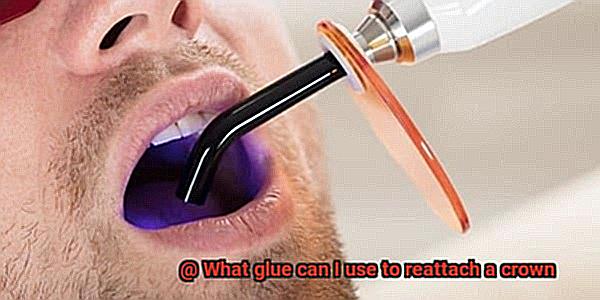
Finally, Resin-Based Cement creates an incredibly strong bond between the tooth structure and the crown material, providing excellent retention and stability. It’s also more resistant to wear and tear than other types of dental adhesives. However, it does require a dry environment to set properly, meaning any moisture can compromise its effectiveness.
When choosing a dental adhesive for your crown, your individual needs and circumstances are important to consider. Your dentist can help you choose the best adhesive based on the type of crown you have, your oral health, and your budget. By selecting the right adhesive, you can ensure that your crown stays securely in place and maintains its appearance and functionality for years to come.
Self-Curing Resin Cement
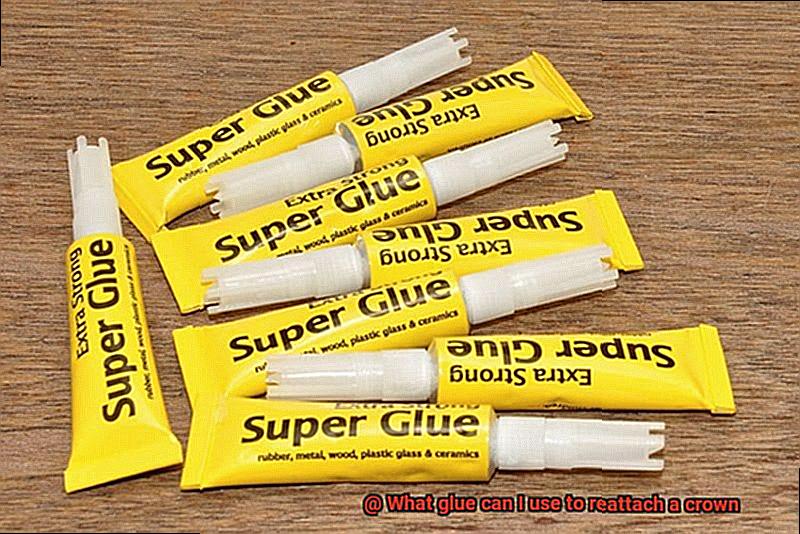
This two-part mixture is a game-changer in the field of dental adhesives, offering several advantages over other options.
The best part? Self-curing resin cement sets quickly and is incredibly durable. Unlike other types of dental adhesive, it doesn’t require any light curing, making it a convenient choice for both dentists and patients alike.
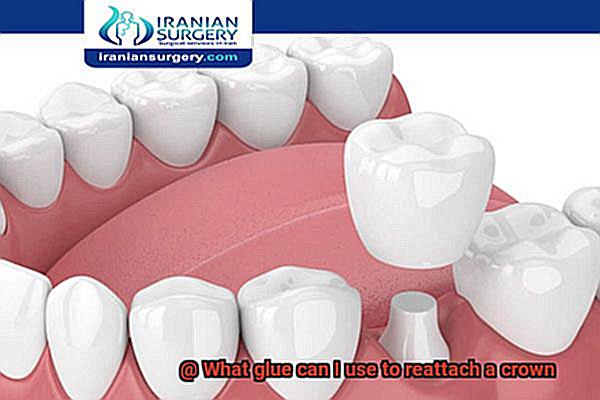
But that’s not all. This type of cement boasts a high bond strength, ensuring your crown will remain securely attached to your tooth. Plus, its low solubility means it is less likely to be affected by oral fluids, reducing the risk of damage to your crown or tooth.
When using self-curing resin cement to reattach a crown, your dentist will first clean your tooth and the inside of the crown thoroughly. Next, they’ll apply the cement mixture to the inside of the crown and place it onto your tooth. The dentist will hold the crown in place until the cement sets, ensuring a strong and long-lasting bond.
It’s important to note that self-curing resin cement should only be used by a dental professional. Attempting to reattach a crown at home with this type of cement could result in serious damage to your tooth or crown and could lead to more significant dental problems down the road.
Light-Curing Resin Cement
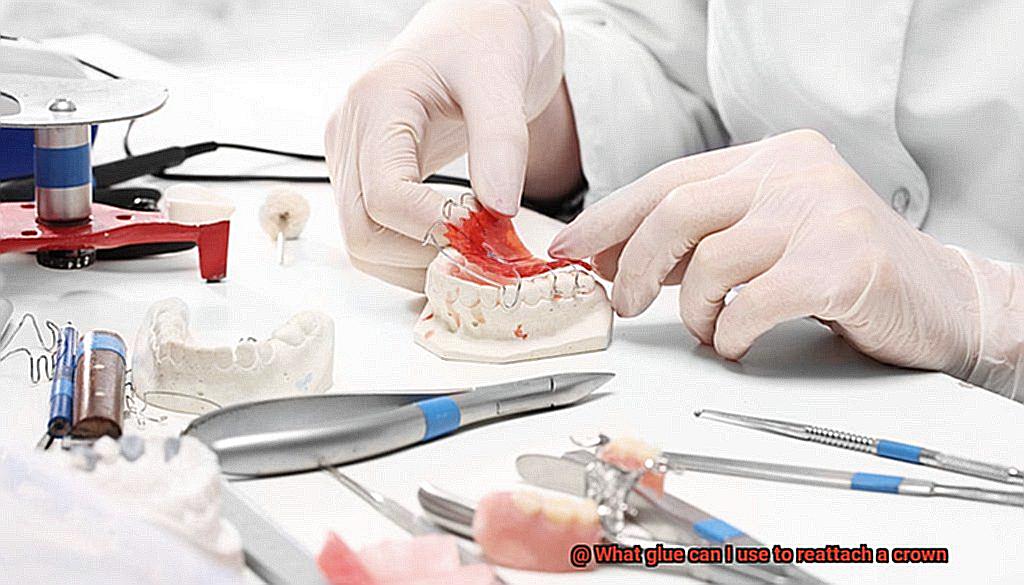
Dealing with a loose crown can be stressful, but luckily there is a solution that’s both efficient and reliable: light-curing resin cement. This type of cement is specifically designed to harden when exposed to a particular wavelength of light, creating a strong and durable bond that will reattach your crown in no time.
Before applying the cement, your dental professional will ensure that both the tooth and the crown are dry and clean. Once this is done, they will apply the cement to the inside of the crown and hold it in place on your tooth for a few seconds while shining a special light onto the cement. This process causes the cement to harden and securely bond the crown to your tooth.
It’s worth noting that light-curing resin cement requires precise timing and placement, which is why it’s essential to leave this method to the experts. Additionally, it’s not recommended for use on severely damaged teeth, as removing cured cement can be challenging.
Glass Ionomer Cement
When your crown goes rogue, glass ionomer cement is the hero you need. Not only does it reattach your crown, but it also releases fluoride to help prevent tooth decay. This dental adhesive is made from a unique concoction of glass powder and organic acid that creates an unbreakable bond.
This cement is a top choice for bonding to enamel and dentin, making it perfect for those tricky areas in your mouth where there isn’t much tooth structure left to work with. Plus, its fluoride-releasing properties make it an excellent option for long-term dental health.
To reattach your crown, your dentist will begin by cleaning the inside of the crown and the tooth that it will be attached to. Then, they’ll mix the cement according to the manufacturer’s instructions and apply it to the inside of the crown before carefully placing it onto your tooth. With a bit of patience while waiting for the cement to set, your crown will be back in place in no time.
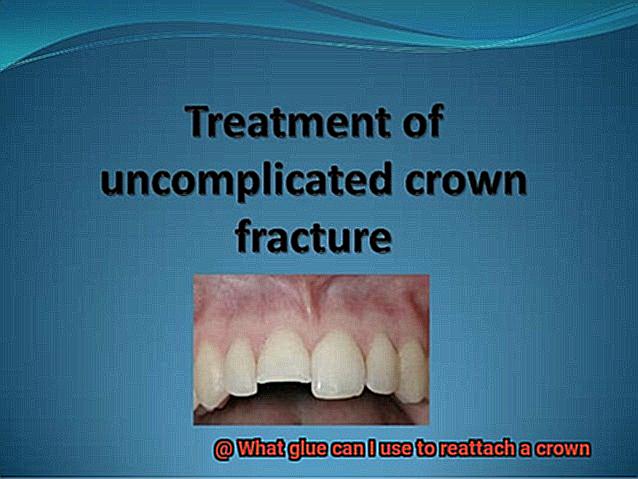
It’s important to note that not all types of crowns or situations are suitable for glass ionomer cement. Your dentist will be able to determine whether this type of cement is appropriate for your specific needs.
Over-the-Counter Glues to Avoid
However, not all glues are created equal, and some types should be avoided at all costs.
Firstly, super glue or cyanoacrylate glue may seem like a convenient solution, but it can cause more harm than good. This type of glue can damage the tooth and surrounding tissues, leading to sensitivity and pain. So, it’s best to steer clear of this adhesive for dental use.
Another glue type that should be avoided is epoxy resin. While this adhesive is commonly used for arts and crafts projects, it can cause irritation and inflammation in the surrounding tissues. Additionally, it can be challenging to remove from the tooth, making it unsuitable for dental use.
It’s also crucial to avoid any glue containing formaldehyde or other harmful chemicals as these substances can cause severe health problems.
If you’re looking to reattach a crown, we recommend using a dental adhesive specifically designed for this purpose. These adhesives are safe for use in the mouth and provide a strong and long-lasting bond. However, it’s vital to consult with a dentist before attempting to reattach a crown at home because improper use of any adhesive can worsen the situation.
OdhAX7Sd0SY” >
Conclusion
In conclusion, a loose or missing crown can be a frustrating and uncomfortable dental issue. Luckily, you can reattach your crown with the right glue without breaking the bank at the dentist’s office. However, it is essential to remember that this is only a temporary fix, and visiting your dentist as soon as possible is crucial to avoid further damage or infection.
Dentists recommend using resin cements or glass ionomer cements instead of over-the-counter glues like superglue or household adhesives. Zinc Oxide Eugenol (ZOE) Cement is a temporary adhesive that has a sedative effect on the tooth pulp, which can help alleviate pain and sensitivity. Glass Ionomer Cement bonds to both the tooth structure and the crown material, making it ideal for use in areas where there is minimal tooth structure left. Resin-Based Cement creates an incredibly strong bond between the tooth structure and the crown material, providing excellent retention and stability.
Self-curing resin cement sets quickly and is incredibly durable but should only be used by dental professionals. Light-curing resin cement hardens when exposed to a specific wavelength of light, creating a robust and durable bond that will reattach your crown in no time. Glass ionomer cement releases fluoride to help prevent tooth decay while creating an unbreakable bond.
It’s crucial to avoid any glue containing formaldehyde or other harmful chemicals as these substances can cause severe health problems. By selecting the right adhesive with your dentist’s help, you can ensure that your crown stays securely in place for years to come while maintaining its appearance and functionality.

